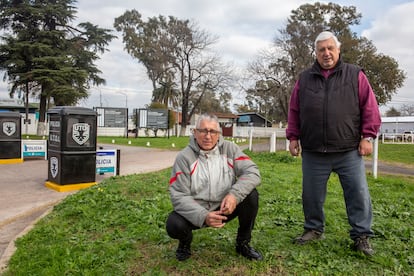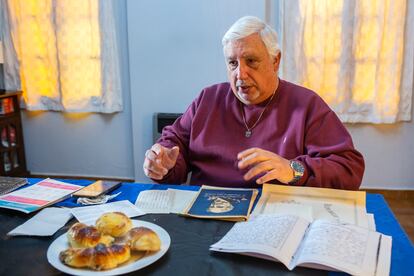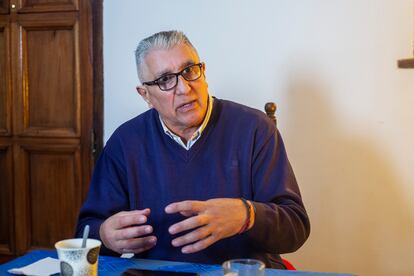Witnesses to a State crime: Argentina seeks former recruits to testify against the dictatorship
The Ministry of Justice and Human Rights has launched a campaign to get thousands of men – who completed compulsory military service between 1976 and 1983 – to provide information about crimes against humanity

The plane in which Gustavo Capra was travelling made a “technical stop” on August 3, 1977, on the way from Ushuaia to Buenos Aires. Capra and 60 other men – who had recently completed a year of compulsory military service in the south – just wanted to go home.
When they finally landed in the capital, Capra crossed the runway and got on the chartered bus, alongside members of his unit. As he was walking, he saw a white Dodge Polara, with all the doors open. It surprised him, but he didn’t stop. Later on, he found out that one of the men travelling with him had been disappeared by the dictatorship that ruled the country. Today, he thinks the man was taken away in that car.
“I didn’t see when they took him away, but I was with this colleague of mine – Miguel Ángel Hoyos – before he disappeared,” recalls Capra, 67. They had left Ushuaia, stopped in Río Grande, then in Río Gallegos and – before arriving in Buenos Aires – the “technical stop” was made in the city of Trelew, in Patagonia. “Some officers got on and grabbed this boy, God rest his soul. I don’t know how much time passed – for me, it was an eternity – until they brought El Negrito back.” El Negro Hoyos – as they called him – was dark-skinned. But when the military put him back on the plane, he was “as pale as a white piece of paper,” Capra sighs.
Once in Buenos Aires, the military made the recruits get off the plane one by one. Capra got out, crossed the tarmac, saw the Dodge with its doors open, got on the bus and didn’t look back. That’s what he told a court in the province of Buenos Aires when he was summoned to testify, back in the 1990s. As he left, he asked the assistant prosecutor if other witnesses had described something similar. The young man replied that, yes, two others had testified to the same thing. “At this point in the game, with 60-odd pirulos (years), how long are we going to wait to say what we saw? We can’t wait any longer, we can’t afford that luxury,” Capra says gravely, while sitting in his dining room.

The Argentine Human Rights Secretariat – a division of the Ministry of Justice and Human Rights – has started a campaign to encourage people who completed compulsory military service between 1976 and 1983 (the years that the last Argentine dictatorship lasted) to offer their testimony regarding what they saw or heard while doing the colimba. This is the colloquial name in the country for the period of military instruction that, from 1902 until 1995, was mandatory for males between the ages of 18 and 20. The Fui colimba campaign (“I was a recruit”) is seeking to gather the statements of “involuntary witnesses” to help in the classification of crimes against humanity. Since it was launched two weeks ago, more than 50 former conscripts have contacted the secretariat by phone or email. The complaints, the campaign organizers emphasize, are confidential.
La @sdhargentina lanza una convocatoria a hombres que hicieron la colimba entre 1975 y 1983. Quienes tengan información para aportar sobre lo que vieron, escucharon y conocieron en esos años, pueden escribir a fuicolimba@jus.gob.ar o llamar al (011) 5300 4139. pic.twitter.com/sQvawGBPQo
— Secretaría DDHH (@SDHArgentina) July 10, 2023
“They were forced witnesses of what happened, because they were in the regiments under the command of different members of the army. Many of them – in the context of fulfilling their compulsory military service – were even forced to take part in some operations,” Federico Efrón tells EL PAÍS. He’s the national director of Legal Affairs for the Human Rights Secretariat. “[These men] had completely secondary roles, without any kind of responsibility. But they were there, they saw what happened. We’re looking for missing information… thousands of conscripts did the colimba during [the years of the dictatorship]. Each testimony is worth a lot.”
With the return to democracy 40 years ago, the National Commission on the Disappearance of Persons (CONADEP) was formed. It was set up to receive testimonies from victims of state repression. Shortly after, the trials against the military commanders of the dictatorship began: five of them were convicted. But between 1986 and 1987, two laws were passed that prevented the war criminals from being prosecuted in the country. On top of this, members of the military leadership – who had been sentenced in 1985 – were subsequently pardoned, on the grounds of “national pacification” being necessary. As of 2003, however, those laws were declared invalid and the trials were reopened. So far, 1,179 Argentines who committed crimes against humanity during the military dictatorship have been sentenced, while 15 trials are ongoing.
The statements made by ex-conscripts have been critical in said trials, such as that of the Campo de Mayo death flights. In this case, the complaint was based on the testimonies of ex-recruits: the information they provided helped prosecutors understand the clandestine flights that the army organized during the Dirty War. Officers would disappear kidnapped people by throwing them into the sea or into rivers from the planes. In July of 2022, four military commanders were sentenced to life imprisonment in this particular case. Even more recently, a sentence was handed down in the case known as RIM 6. The testimonies of former recruits – who were forced to guard the perimeter of a site while five people were abducted and murdered – were key to convicting three non-commissioned officers of the Mechanized Infantry Regiment in the city of Mercedes for crimes against humanity.

The campaign to encourage former conscripted men to declare was first carried out in 2010. At that time, the slogan used was: “Military service is no longer compulsory. Neither is silence.” It was broadcast through the television program Fútbol para Todos (Soccer for All), which had a massive audience, due to its unfiltered broadcasts of the national football team’s soccer matches. One of the promoters of the campaign was the journalist and lawyer Pablo Llonto, who covered the trial of the military junta for the newspaper Clarín. He has represented (pro bono) 360 relatives of the victims and survivors of the dictatorship.
“When the cases were reopened, I had a case [from an incident] that occurred on September 3, 1976, when a group of soldiers raided a house belonging to Montoneros militants (an armed anti-regime group) and committed a massacre: they killed the father, the mother, a boy, a girl. [They also] took a six-month-old baby, who we’re still looking for. That case could be reconstructed from the testimony of ex-colimbas, who spoke up after 30 years,” Llonto tells EL PAÍS by phone. “We understood that [these men] were a tremendous source of information. There were around 300,000 colimbas during those years… it was necessary to start a campaign to search for those who had the facts.”
“Not even 10% have testified”
In the dining room of Capra’s house, sitting next to him is Ricardo Righi. He was a colimba between 1978 and 1979 in Comodoro Rivadavia, a cold and windy city in Patagonia. The two now live on the outskirts of the city of Buenos Aires, in the municipality of La Matanza. During their interview with EL PAÍS – on Thursday, July 20 – it’s freezing cold. On the table,
Monica – Capra’s wife – has laid out croissants and hot coffee. Righi, 63, wears thick glass glasses. He hasn’t bothered taking off his coat.
He also witnessed situations that he wanted to talk about. “At some point, I had to stand guard in the cells. Whenever [the officers] would send me down there, they’d tell me: keep the rifle loaded, without the safety on. I didn’t understand why, because in the dungeons, there could be a colimba [being punished], but nothing serious. But then, they’d tell me, ‘there’s a person arrested who’s a subversive; if he wants to get out of there, you shoot him.’”
Righi saw that kidnapped person three times; the detainee gave him a letter with instructions about where to deliver it, but the conscript burned it out of fear. “I carry it like a burden. I don’t know who he was or what happened to him. I’m also aware that if I had taken [the letter], I wouldn’t be here,” he notes.

Righi and Capra have been hosting a radio program called La voz de los colimbas (The voice of the recruits) for more than 15 years. They offer a critical look at the compulsory military service that trained thousands of young people under conditions of violence and humiliation. They also highlight the cases of disappeared colimbas, while calling on ex-conscripts to speak up about what they “saw, heard or smelled.”
“There are thousands of testimonies that have helped to clear up cases of crimes against humanity... but we know that not even 10% [of recruits] have testified,” Righi laments.
Llonto expresses his urgency by phone: “It’s the last hope of getting information. At this point, it’s very difficult to find a survivor who hasn’t spoken. On the other hand, on the subject of the colimbas, there’s still so much to do.”
The journalist and lawyer points out that one of the reasons why ex-conscripts don’t come forward to testify is because they don’t realize “the importance of the information they have.”
“Many people will tell you: ‘I had this fact, but I didn’t think it was useful, I thought it was minor, I thought [the investigators] already had it…’” The other reason, he continues, is a mixture of feelings, which range from guilt to fear. “You notice this when someone comes to testify and cries and, at the end of the testimony, he tells you: ‘I took a load off my shoulders, I took off the backpack that I was carrying.’”
Sign up for our weekly newsletter to get more English-language news coverage from EL PAÍS USA Edition
Tu suscripción se está usando en otro dispositivo
¿Quieres añadir otro usuario a tu suscripción?
Si continúas leyendo en este dispositivo, no se podrá leer en el otro.
FlechaTu suscripción se está usando en otro dispositivo y solo puedes acceder a EL PAÍS desde un dispositivo a la vez.
Si quieres compartir tu cuenta, cambia tu suscripción a la modalidad Premium, así podrás añadir otro usuario. Cada uno accederá con su propia cuenta de email, lo que os permitirá personalizar vuestra experiencia en EL PAÍS.
¿Tienes una suscripción de empresa? Accede aquí para contratar más cuentas.
En el caso de no saber quién está usando tu cuenta, te recomendamos cambiar tu contraseña aquí.
Si decides continuar compartiendo tu cuenta, este mensaje se mostrará en tu dispositivo y en el de la otra persona que está usando tu cuenta de forma indefinida, afectando a tu experiencia de lectura. Puedes consultar aquí los términos y condiciones de la suscripción digital.








































